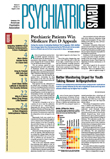Whether in a primary care or a mental health specialty office, elderly people with depression experienced some degree of symptom reduction when they received mental health treatment such as antidepressants, talk therapy, or both.
However, older people with more severe forms of depression experienced a greater degree of symptom relief in a specialist's office than in the primary care setting, according to a trial examining the effectiveness of two mental health service delivery models.
Findings from the Primary Care Research in Substance Abuse and Mental Health for the Elderly (PRISM-E) study appeared in the July Psychiatric Services.
The PRISM-E study was designed to determine if enhancement to and standardization of two models of health care improved access to mental health services and outcomes for people with at-risk drinking (see article above), depression, and anxiety.
As part of the study, 1,531 patients over age 65 at 10 primary care sites were assessed at baseline with the Mini-International Neuropsychiatric Interview and randomized to receive treatment for depression at a primary care clinic or mental health clinic.
Three and six months after baseline, researchers measured depressive symptoms with the Center for Epidemiological Studies Depression Scale (CES-D).
In the integrated care model, mental health and substance abuse services (including assessment, care planning, counseling, case management, psychotherapy, and pharmacological treatment) were offered at the primary care sites, and patients began receiving treatment within two to four weeks after the initial primary care visit.
Patients assigned to the integrated-care model received services from psychiatrists or licensed mental health professionals, including social workers, psychologists, psychiatric nurses, and master's-level counselors.
Under the enhanced specialty referral model, patients were referred to a mental health clinic in the community within two to four weeks of the primary care visit. Patients who were referred to specialty care had access to urgent or emergency consults and transportation.
In addition, when patients missed their first referral appointment, someone from the specialist's office called to try to engage the patient in care as part of the study protocol.
Researchers conducted the study between March 2000 and March 2002.
According to Dean Krahn, M.D., the study's primary investigator, there was no specific treatment protocol for mental health clinicians to practice under either model of care.
Krahn is chief of mental health at the William S. Middleton Memorial veterans Hospital in Madison, Wis., and a professor of psychiatry at the University of Wisconsin.
The majority of the patients had major depression (962 participants), followed by minor depression (325), dysthymia (109), and depression not otherwise specified (135).
The findings are based on an “intent to treat” analysis, which means that the study includes all data from patients in the groups to which they were assigned even if they never received the treatment.
After the six-month assessment, Krahn found that depression severity declined in both models as measured by CES-D scores, with a trend toward greater reduction of CES-D scores in the referral group (7.8 points) than the integrated care group (6.6 points).
For participants with major depression, the referral model was associated with a significantly greater decline in depression severity compared with the integrated care model.
For example, mean scores on the CES-D for those with major depression receiving integrated care dropped by 7.5 points between baseline and the six-month assessment, while scores for those in the referral group dropped by 10.2 points.
Under both models, pharmacotherapy and individual psychotherapy were the most common modes of depression treatment.
Further analyses showed that “the combination of talk therapy plus pharmacotherapy worked better in the enhanced specialty referral model than in the integrated care model for patients with major depression,” according to the report.
Krahn told Psychiatric News that “there are important but somewhat subtle reasons to have both models functioning in a health care system.”
He commented that each model may work better for particular patients under certain circumstances.
“For older people with less-severe depression, integrated care may be effective” at alleviating depressive symptoms, “while for those with more-severe depression, there is still a place for referral to specialty care.”
Krahn noted that not all patients received depression treatment under each model. The study authors said that overall, 70 percent of those assigned to the integrated care model actually saw a mental health professional in that setting, and only 49 percent of participants in the enhanced specialty referral group ever attended a mental health or substance abuse appointment.
Interpreting the findings may also be hampered by the fact that there was no control group in the study.
Krahn noted that “this line of research highlights the fact that we as professionals need to examine how we get people to care, as much [we need to] try and figure out what care is most effective,” he said.
“If they don't receive the treatment, it won't work,” he continued.
The Substance Abuse and Mental Health Services Administration and its three centers, the Center for Mental Health Services, Center for Substance Abuse Treatment, and Center for Substance Abuse Prevention, funded the study.
